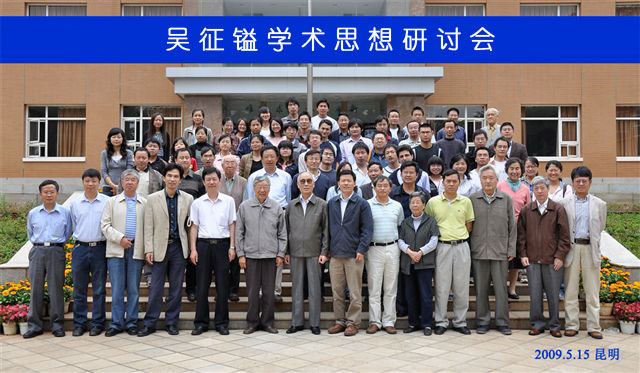In order to further develop and promote Academician Wu Zhengyi's academic thought and promote the study of evolutionary biology, 'The Seminar on Wu Zhengyi's academic thought' was held in Kunming Institute of Botany on May 15th 2009. The researchers of Institute of Botany, CAS, Beijing, Lu Anmin, Chen Zhiduan, Gao Tiangang, Wang JinXiu, the researcher of Wuhan Botanical Garden of CAS Li Jianqiang, the researchers of South China Botanical Garden of CAS Yang Qiner, Xia Nianhe, the researcher of Chengdu Institute of Biology of CAS Gao Xinfen and the researchers of Xishuangbanna Tropical Botanical Garden of CAS Zhu Hua, Li Jie were invited to participate this seminar. More than 80 KIB researchers and staffs took part in the seminar as well.
Researcher Sun Hang, the Party secretary of KIB and the director of CAS Key Laboratory of Biodiversity and Biogeography, emceed the seminar. He first expressed his warm welcome to the experts and guests coming afar, meanwhile he believed that the large-scale systems of angiosperms reflects the evolutionary relationships among various types of angiosperm, lead and guide the whole botanical research in the field. The large-scale systems of angiosperms have an important guiding role in the management and cataloging of plant diversity as well as the development and utilization of plant resources. The role and status of Angiosperms large-scale systems equals that of periodic table of elements in chemistry and building Angiosperms large-scale systems is the important task of evolutionary biology. The Angiosperms 'Eight Class System', which is headed by Academician Wu Zhengyi and co-proposed by scholars Lu Anmin, Tang Yancheng, Chen Zhiduan, Li Dezhu and so on in 1998, is guided by Wu Zhengyi's academic thought 'The evolution of plant and environment three-dimensional rhythms and the occurring of Angiosperms polyphyletic, multi-phase, multi-domain', based on Wu Zhengyi and his research team's decades long in-depth study and understanding of botany, integrated the latest results of Angiosperm phylogeny in the world, especially the molecular systematic study, and then is proposed. The 'Eight Class System' is a significant contribution of Wu Zhengyi and his research team to the evolutionary biology research and the international botany. This seminar is not only an important opportunity for earnestly studying and understanding Wu Zhengyi's academic thought, but also will play an important role in promoting the evolutionary biology research in KIB and even in China.
On the seminar, researcher Lv Chunchao readout Academician Wu Zhengyi's written statement. Since the Angiosperms 'Eight Class System' was published, Academician Wu Zhengyi never stopped thinking and re-thinking the 'Eight Class System'. He promoted and facilitated the holding of this seminar. And he hoped 'testing the bottom of the water through throwing stone', that is, with the 'open' form, everyone could in-depth think the 'Eight Class System' and through self-innovation research, propose new understanding, new ideas and new theory with the scholarly spirit-'in-depth read, in-depth think and in-depth write'.
On the seminar, researcher Lu Anmin made special reports on "The origin and development of Angiosperms 'Eight Class Systems'", Chen Zhiduan on "The thinking of future research for 'Eight Class System'", researcher Li Dezhu on "Molecular phylogeny, molecular Geography and 'Eight Class System'", researcher Zhou Zhekun on "The origin and evolution of angiosperms - from the fossil record to see 'Eight Class System'", researcher Sun Hang on "The evolution of Angiosperms in space-from the aspect of moderngeographic distribution pattern to understand the 'Eight Principal System'" and researcher Peng Hua on "The learning experience of Angiosperms 'Eight Class System'". Six speakers of the special reports, from the aspects of the history, background , scientific research foundation, argument basis and academic essence of the 'Eight Class System' as well as the relevance with plant fossils, molecular phylogeny, modern plants geographic distribution pattern, molecular geography and so on, comprehensively introduced the origin and meaning of the 'Eight Class System', discussed the significance and academic value of the 'Eight Principal System' and put forward the suggestions and comments about the need of in-depth study for 'Eight Principal System'.
Researchers Li Jianqiang, Li Heng, Zhu Hua, Gao Tiangang, Wu Sugong, Li Jie, Wang Qi, Yin Tingshuang, Zhou Zhekun, Sun Hang, Guo Shuangxing, Gao Lizhi and Chen Zhiduan, etc made warm and constructive statements on the seminar and delivered true sights on the argument basis, academic transcend, covered fields, subject integration and view collision of the 'Eight Class System', which aroused great academic interest of participants, especially the young researchers and graduate students. Everyone pledged to further 'in-depth read, in-depth think and in-depth write' Wu Zhengyi's academic thought, understand its true meaning, grasp its essence and make new contributions to its development.
Researcher Lu Anmin full-heartedly proposed the suggestion of founding the 'Wu Zheng-yi's Academic Thought Research Society' and got participants' unanimous approval.
KIB's Director Li Dezhu made meeting conclusion speech. He pointed out that the holding of this seminar fully reflects the necessity and importance of learning and discussing Wu Zhengyi's academic thought. He emphasized that, "due to the development of the molecular biology and genomics, we are in the times of the large-scale development of biological evolution study and should stand on the new steps of subject development and face the world. According to the 'Three-dimensional rhythms' proposed by Academician Wu, we should, through the cross-over study of such dimensions as evolution form, time, space, ecosystem and earth environment, develop in-depth research on biological evolution and biogeography so as to put forward new views and make new contribution to the research of Angiosperms large-scale systems. We strongly agreed on the proposal of founding 'Wu Zhengyi's Academic Thought Research Society' raised by the experts and should lose no time in organizing the implementation and concretely put into effort step by step. We must well organize and unify more young people inside and outside KIB to participate the learning and discussion of Wu Zhengyi's academic thought with more open mind and further develop Wu Zhengyi's academic thought. We particularly hope the younger generation scientists should seriously study and in-depth understand Wu Zhengyi's academic thought, for they are the main force to develop Wu Zhengyi's academic thought and are given great expectations".





